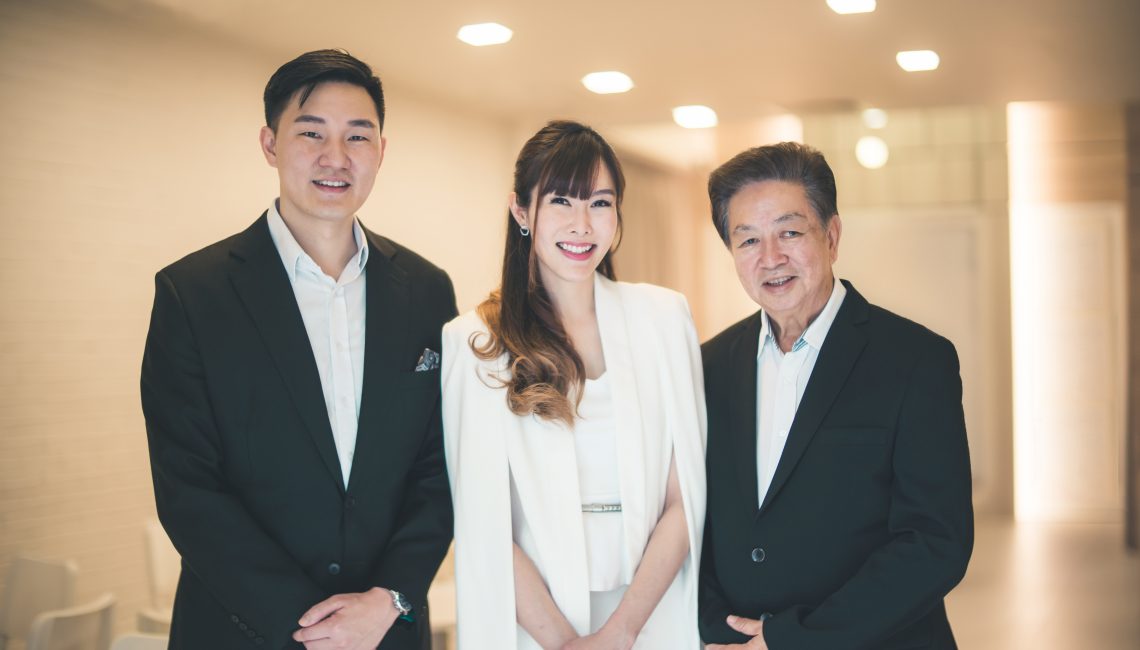This is an interview series with funeral directors in Singapore. Read about how they help you through a time of bereavement and get tips for choosing one when the need arises.
Obits.sg speaks with Jenny Tay from Direct Funerals.
Why did you become a funeral director?
I saw how my father dedicated his life to sending off the deceased in a dignified manner at a young age. More importantly, he helped families tide through a difficult period of time. My father inspires me and I have always known that I wanted to help people the way he did. When I was 18, I wanted to expand my knowledge in embalming so that I could help my Dad. But he advised me to get my business degree and gain some working experience first before I made any decisions about this career.
In 2013, my father had a heart attack that left him hospitalised. As I didn’t want him to be tired out at work, Darren and I came to a very swift decision to leave our jobs immediately and join him to lighten his workload. It was really my love for my father and also my interest in this line of work at a young age that made it an easy decision for me to join him.
What qualifications do you need to become one?
In our company, paper qualifications are not that important. We feel that personal traits such as the following are much more important:
1) Compassionate – A funeral director is there for the family throughout the grieving process and it’s important for us to be there to comfort and listen to the bereaved families.
2) High emotional intelligence – People are most vulnerable when a death occurs in the family, thus its important to know what to say and avoid talking about sensitive subjects that may further sadden the bereaved family members.
3) A keen eye for detail to understand the different rituals required for each religion.
4) Being attentive and meticulous to be sensitive to the bereaved family’s needs.
5) As a funeral director, it’s very important to be well organised and possess proper time management skills. Funeral management requires a funeral director to have good event management skills. We may have several funeral cases daily that needs us to arrange the logistics for each case efficiently. At each point in time, we concurrently oversee several cases and each case has its own requirement.
We have to oversee the entire process of the funeral, including collecting of the deceased body, make-up and embalming, setting up tentage for the wake, liaising with our vendors and the religious leader, to cremation or burial and collecting the ashes. It’s crucial to ensure good communication within the different stakeholders so that the funeral ceremony is well executed.
How long have you been in your role? Why did you choose to be in this profession?
I have been running the company together with my husband Darren Cheng for about six years since we took over the business from my Dad. It’s a meaningful profession and we have decided it will be our life-long careers.
Describe a typical day on the job for yourself and your team.
I frequently inspect the ground as I’m always developing and improving on current funeral set-ups and the service flow so that we will always be at the forefront of providing positive user experience.
As for my team, we are an events company that operates daily, seven days a week. We are activated as soon as someone informs us about the passing of their loved ones. From embalming to setting up at wakes, to religious ceremonies, cremation and burial, our team is dedicated to serving families with empathy and professionalism.
Which part of your job do you find most satisfying?
When I see families have peace of mind from knowing that their loved one’s final journey is well executed and they can grieve in peace in the presence of their closest ones. That sense of family kinship and love motivates me to do my best for them.
Which part of your job do you find most challenging?
My job is definitely not for the faint-hearted as we deal with grief and death on a daily basis. However, it is a very meaningful career as we help the family through the grieving process, comfort them, listen to them and provide them with proper closure during their time of loss.
To join this trade, you must be on the ground to understand how a funeral is being prepared. This means you must be comfortable with facing death.
The skills needed are similar in many ways to event management, and what’s most important is that you have a compassionate heart. If you want to join this trade, you also have to be prepared to be on standby 24 hours a day.
If you could change something about what you do, what would that be? Why?
In Singapore, funerals are often carried out in a solemn manner as families grieve over their loss. However, there is an increasing number of families who choose to celebrate the life of their beloved. I hope that we can continue to encourage that kind of commemoration, where families celebrate the life of their beloved by remembering him for who he is, what he likes, his beautiful life when he was around. Though a funeral is a day in a lifetime, it is actually the commemoration of a person’s lifetime in a day that will be most significant.
Tell us something about yourself that makes you well-suited for your role as a funeral director.
I care a lot about people and am very sensitive to how they feel. That sense of empathy is a very important trait in a funeral director.
Which services are most requested for by clients?
We usually provide funeral services when a death occurs. However, there are more people opting to do pre-planning so that they can be better prepared when the inevitable happens.
Is there something about funeral directors that you would like clients to better understand?
I guess now the impressions of funeral directors as better as compared to the pass when I first joined. In the past, my customer will ask me why are you in this trade, they assume that people in this trade are not educated and are supposed to look very ‘gloomy’. However, now that we have revamped our image as funeral directors, people have a new form of respect for people working in the trade.
Who is someone that inspires you? Why?
That would definitely be my Dad. Since my husband and I took over the company, we continue to help poor families by providing pro-bono funeral services, and we handle at least one or two pro-bono cases a week. I feel very strongly for my father’s mission to help people, thus, this is a legacy that I will definitely continue. It is very meaningful to be able to help people and give back to society.
Can you give a tip or two for someone who has just lost a close family member – how should they go about shortlisting a funeral director?
Do proper research to find the right funeral director who is suitable for you. Ensure that the pricing that they quote is transparent with no hidden cost. The Association of Funeral Directors has a good list of funeral companies to base your research on.

